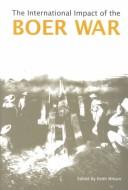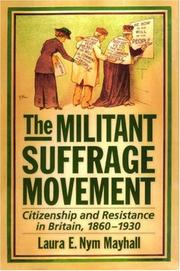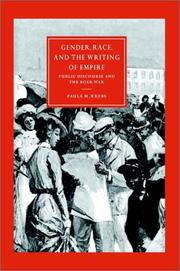| Listing 1 - 10 of 13 | << page >> |
Sort by
|
Book
ISBN: 0773596607 0773596593 9780773596597 9780773596603 0773544321 9780773544321 9780773544321 Year: 2014 Publisher: Montréal [Québec] Ottawa, Ontario
Abstract | Keywords | Export | Availability | Bookmark
 Loading...
Loading...Choose an application
- Reference Manager
- EndNote
- RefWorks (Direct export to RefWorks)
Charles Henry Tweddell (1869-1921) was one of several thousand Canadian soldiers who fought with British forces in the Second Anglo-Boer War (1899-1902). A methodical diarist, Tweddell recounts his year of service from the time he left Quebec City until his return. Tweddell's diary captures the sounds, sights, and stench of war, its friendships and rivalries, its routine and boredom, its death, disease, and injury. Readers are taken into the battlefield and the British military’s disastrous medical services and facilities, and his month-long sight-seeing sick leave in London. Tweddell's diary suggests the allure of late nineteenth-century warfare, an appeal that drew many Boer War veterans, Tweddell included, to volunteer for service in the Great War that followed. Carman Miller's introduction presents a concise analysis of the Boer War's origins and its appeal to Canadian volunteers, and places the diarist within Quebec City's distinct society of overlapping religious, ethnic, and linguistic identities. Tweddell's diary, presented here in full for the first time, offers a rare and fascinating first-person account of Charlie's first war. It is a privileged insight into the fabric of late nineteenth-century military life, its opportunities, and personal costs, seen through the eyes of a perceptive observer and sympathetic raconteur.
South African War, 1899-1902. --- Tweddell, C. H., --- Canada.
Book
ISBN: 1498223214 9781498223218 9781498223201 1498223206 1498223222 9781498223225 Year: 2017 Publisher: Eugene, Oregon
Abstract | Keywords | Export | Availability | Bookmark
 Loading...
Loading...Choose an application
- Reference Manager
- EndNote
- RefWorks (Direct export to RefWorks)
South African War, 1899-1902 --- Religious minorities --- Religion and politics --- South African War (1899-1902) --- 1899-1902 --- Canada --- Canada. --- Religion.
Book
ISBN: 9789025369934 9025369936 Year: 2013 Publisher: Amsterdam Athenaeum-Polak & Van Gennep
Abstract | Keywords | Export | Availability | Bookmark
 Loading...
Loading...Choose an application
- Reference Manager
- EndNote
- RefWorks (Direct export to RefWorks)
"Oorsprong van de apartheid. Eerste mediaoorlog. Voorproefje van de Eerste en de Tweede Wereldoorlog. De (Anglo)-Boerenoorlog (1899-1902) behoort tot de meest intrigerende conflicten in de moderne geschiedenis. Het verschil in status tussen supermacht Groot-Brittannie ̈en de twee nietige Boerenrepublieken, bewoond door afstammelingen van Nederlandse kolonisten, was bizar groot. Toch moesten de Britten heel ver gaan om de oorlog te winnen, tot en met systematische terreur tegen de burgerbevolking. Martin Bossenbroek, auteur van historische klassiekers als 'Holland op zijn Breedst' en 'De Meelstreep', vertelt het hele verhaal. Hij verplaatst zich in alle partijen en volgt drie kleurrijke hoofdpersonen op de voet: de Nederlandse jurist Willem Leyds, de Engelse oorlogsverslaggever Winston Churchill en de Boerencommando Deneys Reitz. Nooit eerder werd de Boerenoorlog zo compleet en zo beeldend beschreven"--Provided by publisher.
South African war, 1899-1902 --- 968.0.04 --- 968.0.04 Geschiedenis van Zuid-Afrika: 19de en 20ste eeuw--(1814-1909) --- Geschiedenis van Zuid-Afrika: 19de en 20ste eeuw--(1814-1909) --- South African War, 1899-1902 --- Anglo-Boer War, 1899-1902 --- Boer War, 1899-1902 --- Transvaal War, 1899-1902 --- History of Africa --- anno 1900-1909 --- anno 1800-1899 --- South Africa --- Guerre des Boers (1899-1902) --- Guerre des Boers, 1899-1902. --- South African War, 1899-1902. --- 1899-1902.

ISBN: 1317490061 131749007X 1315710811 1282921274 9786612921278 1844653250 9781844653256 9781317490074 9781902683188 1902683188 9781902683195 1902683196 9781315710815 9781317490050 9781317490067 Year: 2001 Publisher: Chesham Acumen
Abstract | Keywords | Export | Availability | Bookmark
 Loading...
Loading...Choose an application
- Reference Manager
- EndNote
- RefWorks (Direct export to RefWorks)
Although much has been written about the conduct of the war in South Africa very little has been written about how it was regarded on the world stage by powers both great and small. This collection of specially commissioned essays seeks for the first time to put the Boer War (18991902) in its international context. Each of the core chapters focuses on the perspective of one country (France, Germany, Austria-Hungary, Italy, The Netherlands, Portugal, Russia, and the United States) and assesses the extent to which each national government tried to capitalize on Britain's embarrassment and distraction while often entangled in imperialist ventures of their own. The Anglophobia of many of the nations' press, the activities of pro-Boer organizations, and the shaping of public and parliamentary opinion are examined alongside the real politics and diplomatic considerations that took precedence. In addition there are summation chapters that examine both the origins of the war and its legacy for Britain's expansionist ambitions. Together these essays present the latest findings on a watershed in international relations that heralded substantive changes of attitude and policy on the part of national governments towards their dependencies and had far-reaching consequences for alliance systems and the international balance of power at the start of the twentieth century.
South African War, 1899-1902 --- Anglo-Boer War, 1899-1902 --- Boer War, 1899-1902 --- Transvaal War, 1899-1902 --- Influence. --- Diplomatic history. --- Great Britain --- South Africa --- Foreign relations
Book
ISBN: 9781781385722 9781846319686 1781385726 1846319684 9781781381038 1781381038 Year: 2013 Publisher: Liverpool : Liverpool University Press,
Abstract | Keywords | Export | Availability | Bookmark
 Loading...
Loading...Choose an application
- Reference Manager
- EndNote
- RefWorks (Direct export to RefWorks)
The experience of the South African War sharpened the desire to commemorate for a number of reasons. An increasingly literate public, a burgeoning populist press, an army reinforced by waves of volunteers and, to contemporaries at least, a shockingly high death toll embedded the war firmly in the national consciousness. In addition, with the fallen buried far from home those left behind required other forms of commemoration. For these reasons, the South African War was an important moment of transition in commemorative practice and foreshadowed the rituals of remembrance that engulfed Britain in the aftermath of the Great War. This work provides the first comprehensive survey of the memorialisation process in Britain in the aftermath of the South African War. The approach goes beyond the simple deconstruction of memorial iconography and, instead, looks at the often tortuous and lengthy gestation of remembrance sites, from the formation of committees to the raising of finance and debates over form. In the process both Edwardian Britain's sense of self and the contested memory of the conflict in South Africa are thrown into relief. In the concluding sections of the book the focus falls on other forms of remembrance sites, namely the multi-volume histories produced by the War Office and The Times, and the seminal television documentaries of Kenneth Griffith. Once again the approach goes beyond simple textual deconstruction to place the sources firmly in their wider context by exploring both production and reception. By uncovering the themes and myths that underpinned these interpretations of the war, shifting patterns in how the war was represented and conceived are revealed.
South African War, 1899-1902. --- Anglo-Boer War, 1899-1902 --- Boer War, 1899-1902 --- Transvaal War, 1899-1902 --- History --- Boer War --- Second Boer War --- South Africa
Book
ISBN: 029777395X Year: 1979 Publisher: London Weidenfeld and Nicolson
Abstract | Keywords | Export | Availability | Bookmark
 Loading...
Loading...Choose an application
- Reference Manager
- EndNote
- RefWorks (Direct export to RefWorks)
History of Africa --- anno 1900-1909 --- anno 1800-1899 --- South Africa --- South African War, 1899-1902 --- Guerre des Boers --- 968.0.04 --- Geschiedenis van Zuid-Afrika: 19de en 20ste eeuw--(1814-1909) --- South African War, 1899-1902. --- 968.0.04 Geschiedenis van Zuid-Afrika: 19de en 20ste eeuw--(1814-1909)
Book
ISBN: 1612000185 9781612000183 9781612000077 Year: 2011 Publisher: Newbury [UK] Philadelphia Casemate Pub.
Abstract | Keywords | Export | Availability | Bookmark
 Loading...
Loading...Choose an application
- Reference Manager
- EndNote
- RefWorks (Direct export to RefWorks)
The Battle of Spion Kop was fought during the campaign to relieve Ladysmith, South Africa, after the Boers of the Transvaal and Orange Free State had gotten a jump on the British Empire and besieged a British army in the town. It was the single bloodiest episode in the campaign, as well as a harbinger of the bitter and desperate fighting still to come in the Second Boer War.Spion Kop, just northeast of Ladysmith, was the largest hill in the region, being over 1,400 feet high, and it lay almost exactly at the center of the Boer line. If the British could capture this position and bring artiller
Spion Kop, Battle of, South Africa, 1900. --- South African War, 1899-1902. --- Anglo-Boer War, 1899-1902 --- Boer War, 1899-1902 --- Transvaal War, 1899-1902 --- Spioenkop, Battle of, 1900 --- South African War, 1899-1902 --- Campaigns --- Ladysmith (South Africa) --- Great Britain --- History --- History, Military
Book
ISBN: 9780252039560 9780252097652 0252097653 0252039564 Year: 2015 Publisher: Urbana
Abstract | Keywords | Export | Availability | Bookmark
 Loading...
Loading...Choose an application
- Reference Manager
- EndNote
- RefWorks (Direct export to RefWorks)
The South African War (1899-1902), also called the Boer War and Anglo-Boer War, began as a conventional conflict. It escalated into a savage irregular war fought between the two Boer republics and a British imperial force that adopted a scorched-earth policy and used concentration camps to break the will of Afrikaner patriots and Boer guerrillas. This work delves into the agonizing choices faced by Winburg district residents during the British occupation.
Civilians in war --- Civil-military relations --- South African War, 1899-1902, --- War --- War and society --- Anglo-Boer War, 1899-1902 --- Boer War, 1899-1902 --- Transvaal War, 1899-1902 --- Military and civilian power --- Military-civil relations --- Executive power --- Sociology, Military --- Military government --- Occupied territories. --- Winburg (South Africa) --- History. --- South African War, 1899-1902 --- Occupied territories

ISBN: 0190289481 1280503068 0195347838 1602569630 9780195347838 0195185633 9780195185638 9781280503061 9781602569638 9786610503063 6610503060 0195159934 9780195159936 0195159934 9780195159936 019771465X Year: 2003 Publisher: [Oxford] New York Oxford University Press
Abstract | Keywords | Export | Availability | Bookmark
 Loading...
Loading...Choose an application
- Reference Manager
- EndNote
- RefWorks (Direct export to RefWorks)
The image of upper-class women chaining themselves to the rails of 10 Downing Street and going on hunger strike has become synonymous with the British suffragette movement. Mayhall examines the strategies that suffragettes employed to challenge the definitions of citizenship in Britain.
Women --- Women's rights --- South African War, 1899-1902. --- Anglo-Boer War, 1899-1902 --- Boer War, 1899-1902 --- Transvaal War, 1899-1902 --- Rights of women --- Human rights --- Suffrage --- History. --- Civil rights --- Law and legislation --- Legal status, laws, etc. --- Great Britain --- Politics and government --- History --- 1837-1901 --- 1901-1936 --- Victoria, 1837-1901 --- Edward VII, 1901-1910 --- George V, 1910-1936 --- South African War, 1899-1902 --- Transvaal (South Africa) --- War of 1880-1881 --- Citizenship --- Government, Resistance to

ISBN: 0511149654 0511323158 0511484852 0511048394 0511117817 1280153873 0521653223 9780521607728 9780521653220 9780511484858 1107117666 0511033168 9780511033162 0511006993 9780511006999 9780511117817 0521607728 9780511048395 9781107117662 9780511149658 9780511323157 9781280153877 Year: 1999 Volume: 23 Publisher: Cambridge ; New York : Cambridge University Press,
Abstract | Keywords | Export | Availability | Bookmark
 Loading...
Loading...Choose an application
- Reference Manager
- EndNote
- RefWorks (Direct export to RefWorks)
All of London exploded on the night of May 18, 1900, in the biggest West End party ever seen. The mix of media manipulation, patriotism, and class, race, and gender politics that produced the 'spontaneous' festivities of Mafeking Night begins this analysis of the cultural politics of late-Victorian imperialism. Paula M. Krebs examines 'the last of the gentlemen's wars' - the Boer War of 1899-1902 - and the struggles to maintain an imperialist hegemony in a twentieth-century world, through the war writings of Arthur Conan Doyle, Olive Schreiner, H. Rider Haggard, and Rudyard Kipling, as well as contemporary journalism, propaganda, and other forms of public discourse. Her feminist analysis of such matters as the sexual honor of the British soldier at war, the deaths of thousands of women and children in 'concentration camps', and new concepts of race in South Africa marks this book as a significant contribution to British imperial studies.
South African War, 1899-1902 --- English literature --- Imperialism in literature. --- Sex role in literature. --- Race in literature. --- Anglo-Boer War, 1899-1902 --- Boer War, 1899-1902 --- Transvaal War, 1899-1902 --- Literature and the war. --- Foreign public opinion, British. --- History and criticism. --- South Africa --- Great Britain --- Africa, South --- Foreign relations --- In literature. --- Thematology --- anno 1800-1999 --- 20th century --- History and criticism --- 19th century --- Imperialism in literature --- Race in literature --- Foreign public opinion [British ] --- South Africa in literature --- South Africa - Foreign public opinion, British. --- South African War, 1899-1902 - Foreign public opinion, British. --- South Africa - Foreign relations - Great Britain. --- Great Britain - Foreign relations - South Africa. --- Arts and Humanities --- Literature --- South African War, 1899-1902 - Literature and the war. --- English literature - 20th century - History and criticism. --- English literature - 19th century - History and criticism.
| Listing 1 - 10 of 13 | << page >> |
Sort by
|

 Search
Search Feedback
Feedback About UniCat
About UniCat  Help
Help News
News